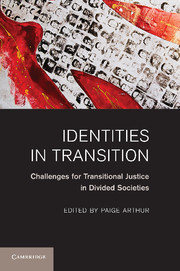Book contents
- Frontmatter
- Contents
- Acknowledgments
- Author Bios
- Introduction: Identities in Transition
- PART I IDENTITY IN TRANSITIONAL JUSTICE MEASURES
- PART II IDENTITIES, TRANSITION, AND TRANSFORMATION
- 7 Canada and the Legacy of the Indian Residential Schools: Transitional Justice for Indigenous People in a Nontransitional Society
- 8 Transitional Justice and the Rights of Minorities and Indigenous Peoples
- 9 “Fear of the Future, Lived through the Past”: Pursuing Transitional Justice in the Wake of Ethnic Conflict
- 10 Transitional Justice, Federalism, and the Accommodation of Minority Nationalism
- 11 History Education Reform, Transitional Justice, and the Transformation of Identities
- Index
9 - “Fear of the Future, Lived through the Past”: Pursuing Transitional Justice in the Wake of Ethnic Conflict
Published online by Cambridge University Press: 01 March 2011
- Frontmatter
- Contents
- Acknowledgments
- Author Bios
- Introduction: Identities in Transition
- PART I IDENTITY IN TRANSITIONAL JUSTICE MEASURES
- PART II IDENTITIES, TRANSITION, AND TRANSFORMATION
- 7 Canada and the Legacy of the Indian Residential Schools: Transitional Justice for Indigenous People in a Nontransitional Society
- 8 Transitional Justice and the Rights of Minorities and Indigenous Peoples
- 9 “Fear of the Future, Lived through the Past”: Pursuing Transitional Justice in the Wake of Ethnic Conflict
- 10 Transitional Justice, Federalism, and the Accommodation of Minority Nationalism
- 11 History Education Reform, Transitional Justice, and the Transformation of Identities
- Index
Summary
After the genocide in 1994, the new Rwandan government decided to abolish ethnicity. Arguing that “Hutu” and “Tutsi” identities were pernicious artifacts of Belgian colonial rule that Rwandans would be better off forgetting, the government took steps to create an ethnicity-free public space. Establishing a “unity and reconciliation” campaign, it banned references to ethnic identifications in official discourse, closely regulated speech in the media, and instituted awareness-raising campaigns among the general population.
Can identities simply be abolished? Of course not. Why go to all the trouble, then? Political leaders may, not unreasonably, attempt to forge a new national identity to take the place of previous, divisive ones. Alternatively, they may wish to stress individuality over collective identities in an effort to promote the view that identities should be a matter of personal choice – not external imposition. These strategies may carry particular weight in countries like Rwanda and South Africa, where identity categories were constitutive elements of methods of repression and violence, and where communities must find a way to live together once that repression and violence has ended.
Either way, however, attempting to abolish the “old” identities may simply turn out to be a way of confirming their continuing importance.
THE SALIENCE OF ETHNIC IDENTITIES FOR TRANSITIONAL JUSTICE
Surprisingly little attention has been paid to understanding the ways in which ethnic identities might matter for transitional justice – even when the justice in question is a response to clear-cut cases of identity-based violations, as took place in Rwanda and the former Yugoslavia.
- Type
- Chapter
- Information
- Identities in TransitionChallenges for Transitional Justice in Divided Societies, pp. 271 - 302Publisher: Cambridge University PressPrint publication year: 2010
- 3
- Cited by



